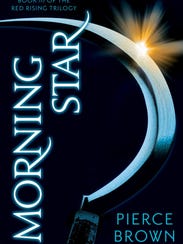
Among Darrow’s insights as he works his way to a position of ascendancy is that “as we pretend to be brave, we become so.”Īn ambitious and satisfying conclusion to a monumental saga.Īre we not men? We are-well, ask Bigfoot, as Brooks does in this delightful yarn, following on his bestseller World War Z (2006).Ī zombie apocalypse is one thing. Along the way we see Darrow become more heroic and daring and Mustang, more charismatic and unswerving, both agents of good in a battle against forces of corruption and domination. Loyalties are conflicted, confusing, and malleable. At the center are Darrow, his lover, Mustang, and the political and military action of the Uprising. This world is vaguely Teutonic/Scandinavian (with characters such as Magnus, Ragnar, and the Valkyrie) and vaguely Roman (Octavia, Romulus, Cassius) but ultimately wholly eclectic. Brown creates an alternative universe that is multilayered and seething with characters who exist in a shadow world between history and myth, much as in Frank Herbert’s Dune. Brown is an expert at creating violent set pieces whose cartoonish aspects (“ ‘Waste ’em,’ Sevro says with a sneer” ) are undermined by the graphic intensity of the savagery, with razors being a favored instrument of combat. He longs both for rescue and for revenge, and eventually he gets both.

This allows him to infiltrate the Gold political infrastructure…but a game’s afoot, and at the beginning of the third volume, Darrow finds himself isolated and imprisoned for his insurgent activities.

Briefly, Darrow of Lykos, aka Reaper, has been “carved” from his status as a Red (the lowest class) into a Gold. This last volume is incomprehensible without reference to the first two.

Brown completes his science-fiction trilogy with another intricately plotted and densely populated tome, this one continuing the focus on a rebellion against the imperious Golds.


 0 kommentar(er)
0 kommentar(er)
